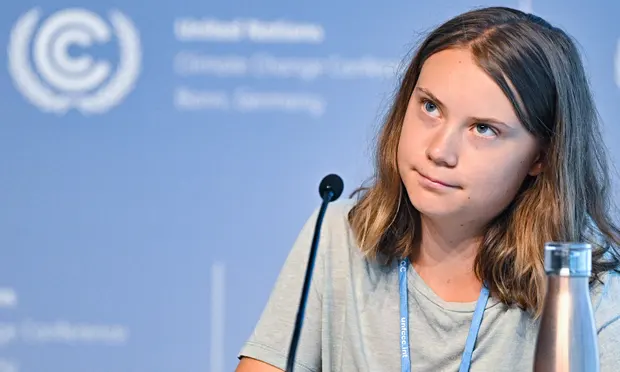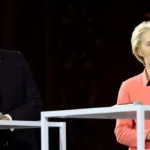
Greta Thunberg: not phasing out fossil fuels is ‘death sentence’ for world’s poor
Rich countries are signing a “death sentence” for millions of poor people around the world by failing to phase out fossil fuels, the climate activist Greta Thunberg has told governments.
She warned on Tuesday that with annual greenhouse gas emissions at an all-time high, only a “rapid and equitable” phaseout of fossil fuels would keep global temperatures within the scientifically advised limit of 1.5C above pre-industrial levels.
“The coming months and years – right now – will be crucial to what the future looks like. It is what we decide now that will define the rest of humanity’s future,” she told a press conference at UN talks in Bonn, where governments are meeting to discuss the climate crisis.
“If we do not [phase out fossil fuels], it will be a death sentence for countless people. It is already a death sentence for countless people,” she said.
Thunberg last Friday announced the end of her school strikes, which she has been undertaking on Fridays since 2018 in protest at political inaction on the climate crisis. The campaigner has left school but intends to carry on speaking out on climate issues, while also giving the spotlight to youth voices from the developing world.
She said a lack of political will to halt fossil fuel exploration and use was threatening to raise global temperatures by more than 1.5C above pre-industrial levels, which could lead the climate to pass “tipping points”, a cascade of impacts that could create runaway global heating.
“We are still rushing towards the cliff. We could trigger feedback loops that are beyond human control, that would throw countless billions under the bus,” she said.
The question of phasing out fossil fuels is expected to be a flashpoint at the Cop28 UN climate talks later this year. The summit will take place in Dubai, hosted by the United Arab Emirates, a major oil and gas producer.
Many countries would like to see Cop28 produce a formal resolution to phase out fossil fuels, or at least to discuss such a phaseout as an official agenda item at the summit. But some countries, chiefly fossil fuel producers including Saudi Arabia, are staunchly opposed, and the UAE presidency has been cautious, saying there is not yet agreement on the agenda.
Chairing the talks will be Sultan Al Jaber, a minister in the UAE government who is also chief of the country’s national oil company, Adnoc, which is planning a massive expansion of fossil fuel production capacity.
Eric Njuguna, a climate justice organiser from Kenya, speaking with Thunberg, said Al Jaber’s dual role was a conflict of interest, and called on him to resign. “It is a stab in the back for poor countries to have a fossil fuel CEO on top of efforts to constrain the climate crisis,” he said.
Al Jaber has told the Guardian he will bring a “business mindset” to the talks, and pointed to his role as co-founder of the Masdar renewable energy company in UAE. He visited the Bonn talks last Thursday, and told a public meeting: “The phasedown of fossil fuels is inevitable.” But he stopped well short of promising to put a phaseout of fossil fuels on the Cop28 agenda.
The talks in Bonn, which started last Monday and will end on Thursday, are to lay the groundwork for Cop28, the conference of the parties under the UN framework convention on climate change, which begins on 30 November.
Progress at Bonn has been slow. Last week’s discussions were characterised by disputes over rich countries that are failing to provide financial assistance to developing countries, to help them cut their greenhouse gas emissions and cope with the impacts of the climate crisis.
Alden Meyer, a senior associate at the thinktank E3G, said: “Much more work remains to be done to land an agreement at Cop28 for a just and equitable reduction of fossil fuel production and use in a timeframe that’s consistent with the Paris [agreement] 1.5C goal.”





